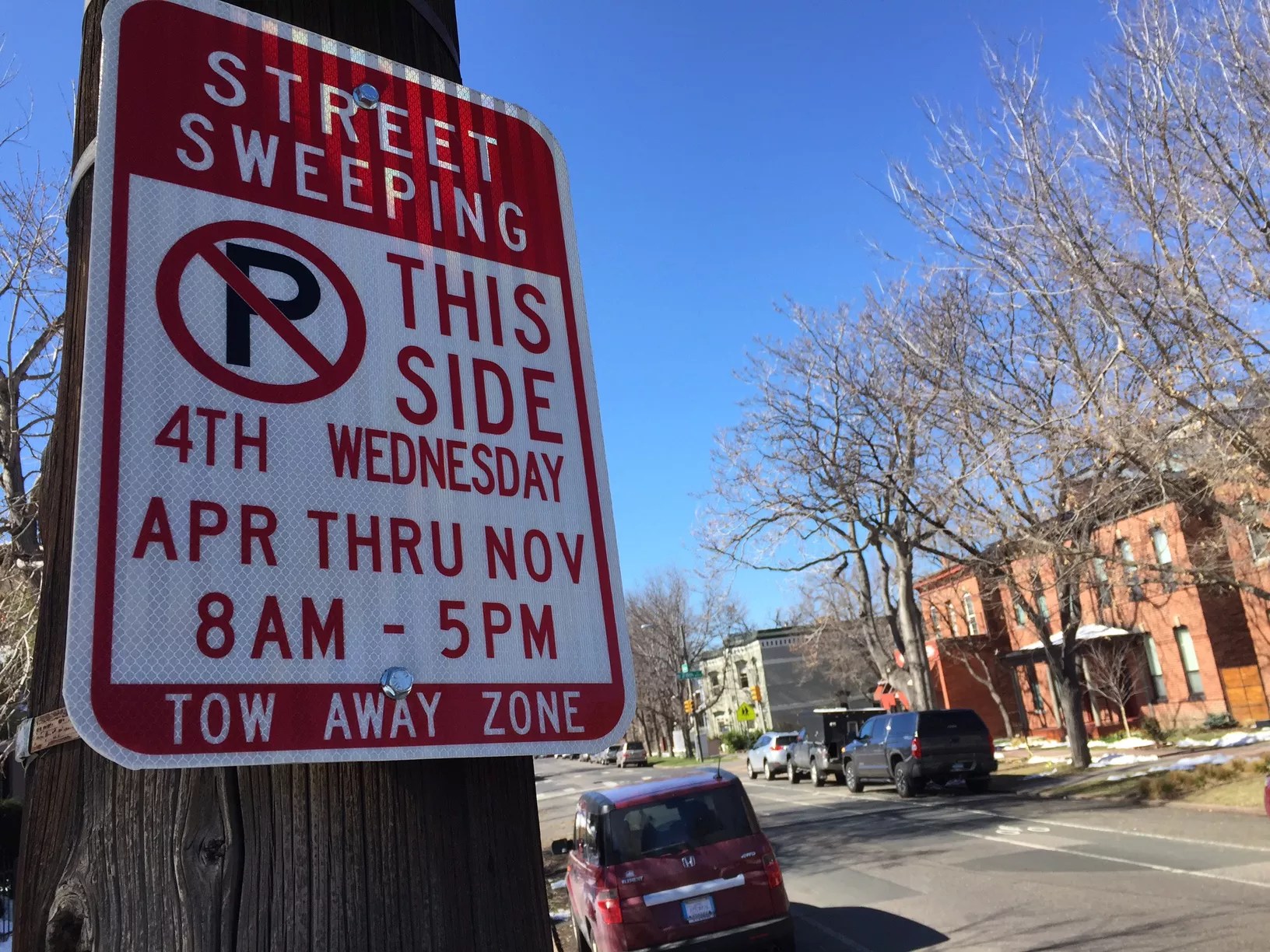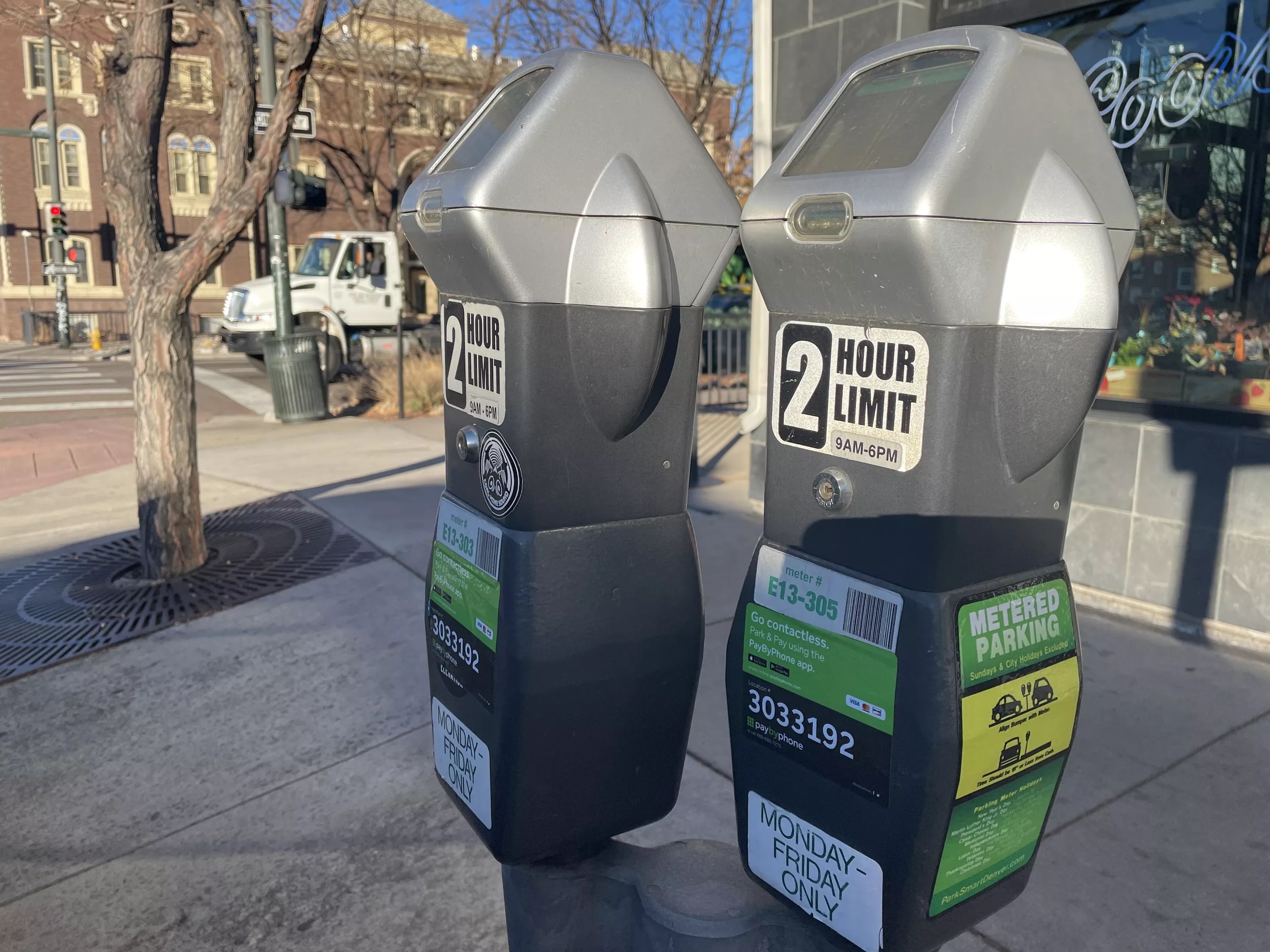
Teague Bohlen

Audio By Carbonatix
In the quest to help small businesses get large commercial vehicles off the roads in front of their property, Denver City Council members considered updates to street parking enforcement at an April 11 Land Use, Transportation, & Infrastructure committee hearing – specifically how far a vehicle must move to qualify as parking in a different spot than the one in which it was parked earlier.
The focus was supposed to be on inoperable and commercial vehicles, but during the meeting, several councilmembers pointed out that the city may have taken a wrong turn on one regulation: The proposed rules would continue to make it illegal for someone to park in front of their own home for more than three consecutive days, even if they leave during the day and return at night.
In fact, the new rules could make it worse.
Currently, cars may not occupy the same space on the public right of way for more than 72 hours, according to Denver law. Residents can get tickets right now for parking in front of their homes while out of town or on a business trip for a few days, and the new rules LUTI considered wouldn’t change that.
The distance that cars have to move to legally re-park in a new spot and reset their 72-hour time-limit clock is currently 100 feet. The new proposal would change that number to 700 feet, which is the average size of a long block, according to city officials.
As noted during the LUTI hearing, many residents – and even council members – have no idea that the 72-hour rule applies to residential areas.
“On my block, everyone parks in front of their house in the same spot,” said Council President Jamie Torres before asking whether the 72-hour rule officially applies to cars parked outside of residences.
Cindy Patton, senior director of operations for the Denver Department of Transportation & Infrastructure, and Marley Bordovsky, the section director for the prosecution and code enforcement in the City Attorney’s Office, both confirmed that the rule applies.
The there are the issues of inoperable vehicles as well as company trucks gobbling up all the nearby parking spaces that residents eye for their own cars.
Councilmember Kendra Black said that she and Councilman Jolon Clark have been working for years on solutions to help residents and local businesses in their districts who are plagued by such junkers and big-name company vehicles, which are often left on city streets for days and sometimes longer.
“We also had other issues with large vehicles parking for months and even years,” Black said at the hearing. “There’s also been issues with blocking sidewalks. … What we’ve learned is that enforcement is really challenging. What these updates do is they’re just going to make our enforcement easier.”
The updates proposed by city officials at the hearing include expanding rules governing large vehicles in residential areas to commercial and industrial areas, changing the distance a vehicle must be moved to count as being parked in a new spot, and expanding the rules involving junkers.
Clark said that small-business owners in his district are struggling in general right now, so challenges with big corporations blocking access to their parking lots or the alleyways and driveways they use for their own delivery vehicles is the last thing they need.
“It really has been a struggle to really get any help for these folks who are trying to continue to do business in the city,” Clark said, adding that many residents hoped that council would go even further than the proposed changes.
Patton noted that in residential areas, large trucks, automobiles and boat trailers not attached to a vehicle, truck-tractors, semi-trailers and inoperable vehicles are all subject to two-hour parking limits.
If Black and Clark get their way, that standard would apply to all areas around the city.
There’s also currently an exception for “rendering services in the area” that large-vehicle owners claim to get out of tickets, according to Patton. That language would be changed to “actively engaged in rendering services in the immediate area” to close the loophole. But all eyes seem to be on the 700-foot rule change.
“That stuff is, again, not as far as a lot of these folks were hoping we would go, but I think gives a little bit of peace of mind and sanity back when you’re trying to run your business all day and also trying to deal with these issues,” Clark said.
Director Bordovsky noted during the hearing that the city has observed people regularly moving their cars just a few spaces, or driving around the block and then parking in the same space they just left – claiming they’ve “rolled 100 feet.” So the 700-foot distance change is aimed at making sure that doesn’t happen.
The changes would formally clarify that driving around the block and returning to the same spot isn’t allowed while also banning inoperable cars from being in the right-of-way for more than 24 hours.

People won’t be able to move to a new meter on the same block if Denver City Council passes new parking regulations.
Catie Cheshire
“Junkers” are currently described under city code as “motor vehicles that are apparently inoperable and extensively damaged.” With the changes, the definition would expand to encompass non-motorized vehicles such as abandoned trailers and vehicles that are in an unsafe condition.
Right now, if a person is in a junker when the enforcement team tries to ticket the vehicle, the ticket is only valid if the person’s driver’s license information is taken. The proposed changes would allow tickets without driver’s license information, as the city has also observed people skirting tickets by refusing to open the door and hand over their license to enforcement officials.
Other changes being proposed include towing when a vehicle is on private property without the owner’s consent; towing when a vehicle is left on the public right-of-way in violation of two-hour or 24-hour limits; towing when junkers are on the right-of-way for longer than 24 hours; and towing when a vehicle was previously booted and an unauthorized person removed the boot.
At-large councilmember Robin Kniech, who is not part of the committee but attended the April 11 hearing, said she was most taken aback by the 700-foot distance change. She’d never considered the residential impact before.
“This is going to be a huge change for people in Capitol Hill, in areas with multi-family housing,” she said. “Particularly, I’m sorry to say, given the impact we’re having with vehicle break-ins.”
Kniech noted how people like to park their car in sight when possible to check if it is safe or whether a catalytic converter thief or other miscreant is on the prowl. A 700-foot requirement means that they would have to park their car more than a block away every three days.
Kniech questioned how it makes sense for people to have to find parking on another block if their street is empty, especially given how hard it can be to park in dense neighborhoods. Clark said that the changes aren’t directed at personal vehicles.
“Where I grew up in this town, my parents would park in the same spot directly in front of their house, their garage, since 1969,” he said. “Whenever we went on vacation longer than 72 hours, technically that was a violation.”
Despite the rule, Clark and Patton both pointed out that the city has never actually cracked down on those violations.
“It is not a place that we use our limited enforcement resources,” Patton said. “But if tickets were written, based on how the code is drafted, it would be a valid ticket.”
Councilmember Amanda Sandoval, who chairs the committee, said that since this type of parking enforcement is complaint-based, she worries that stronger restrictions will leave vulnerable residents more open to discriminatory targeting through complaints. In her district, neighborhoods like Lower Highland and Jefferson Park have many conflicts over parking.
“It’s complaint-based against certain people,” Sandoval said. “‘Those people in their trucks’ or ‘working on their trucks playing their music.’ They send out right-of-way enforcement and they send out neighborhood inspections, and it’s not based on anything illegal. It’s based on those people that they don’t like.”
Black reminded the committee that there isn’t a realistic way to conduct enforcement other than through complaints, and the goal of the changes is to help people struggling with big businesses using the public right-of-way as if it were theirs – not to punish individual people. Clark noted how the problem with not being able to park in front of one’s own home regularly still exists under current regulations.
“We need to think through and solve that problem,” he said. “But I still think that [700 feet] is the right distance. … We have another problem that most of us just don’t think about because it’s not being enforced,” he added, referring to the 72-hour rule.
In the end, the committee passed the updates through for consideration – with Torres and Councilwoman Candi CdeBaca voting no and members Clark, Sandoval, Kendra Black and Chris Herndon voting yes.
They now move on to the full Denver City Council, where the discussion could take a 700-foot detour.